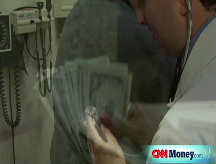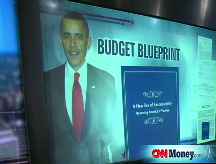Stocks end at 12-year lows
Dow and S&P 500 continue their descent after Citigroup-U.S. deal and GDP plunge.
NEW YORK (CNNMoney.com) -- Stocks tumbled Friday on worries about the government taking a bigger chunk of Citigroup and a bleak reading on the economy, again touching 12-year lows.
The Dow Jones industrial average (INDU) lost 119 points, or 1.7%. It was the lowest close since May 1, 1997.
The S&P 500 (SPX) index lost 18 points, or 2.4%, closing at its lowest point since Dec. 18, 1996.
The Nasdaq composite (COMP) lost 13.5 points, or 1%. The tech-fueled Nasdaq has held up better than the other major averages this year and remains above its lows from Nov. 21, 2008.
The economy shrank at the sharpest pace in 26 years in the fourth quarter of last year, confirming other earlier reports that suggested the economy took a hit in the last three months of last year.
While the report was worse than expected, it also wasn't surprising to investors, following weak readings on manufacturing, employment and consumer spending.
"The report is basically confirming what we already know, based on every indicator we've seen so far," said Matt King, chief investment officer at Bell Investment Advisors. "We know this is the worst recession since at least the early '80s."
As a result, the stock market reaction Friday was negative, but not overwhelmingly so. King said the market is getting closer to the point where it has fully priced in a very dire scenario.
Stocks tumbled Thursday as investors sorted through President Obama's ambitious federal budget for the next 10 years. The plan includes more funds for stabilizing the banking system and a move toward universal health care. The selloff continued Friday, with banking shares leading the way.
In other news, the New York Stock Exchange said it is temporarily waving its minimum price for listed stocks, due to the unprecedented stock market environment. There are 50 stocks that have traded for less than a $100 for at least 30 days, the NYSE said. Typically, those stocks would be put under review, which could eventually lead to a delisting.
Last month, the NYSE changed its market capitalization for listed companies to $15 million from $25 million. Both changes are in effect through the end of June.
Citigroup: The U.S. government has increased its stake in Citigroup, bringing it closer to nationalization. The government will now control as much as 36% of Citigroup's common stock, in a deal that converts preferred shares that Treasury already holds for common shares.
The deal gives the bank more capital, which ideally would lead to more lending. The government already gave Citigroup $45 billion in exchange for preferred shares. Shares of Dow stock Citigroup have plunged around 90% over the last year as the company has struggled to stay solvent amid the housing collapse and the credit market crisis. (Full story)
However, the deal inspired no confidence and Citi (C, Fortune 500) shares slumped 39% with investors worrying that the company will ultimately have to be taken over by the government overall, a move that would completely wipe out shareholders.
Bank of America (BAC, Fortune 500) lost 26%. Wells Fargo (WFC, Fortune 500) lost 16% and Morgan Stanley (MS, Fortune 500) lost 8.4%. The KBW Bank (BKX) sector index lost 8.7%.
GDP: Fourth-quarter gross domestic product growth (GDP) shrank at the sharpest pace in 26 years, the government said Friday. GDP, which measures the output of goods and services made in the U.S., fell at a 6.2% annual rate, the biggest fall in GDP since the first quarter of 1982.
Analysts surveyed by Briefing.com were expecting GDP to fall at a 5.4% annual rate, versus the initially reported decline of 3.8%. Falling exports and the consumer spending recession were the main causes of the slowdown. (Full story)
In other economic news, the Chicago PMI, a regional reading on manufacturing, rose to 34.2 in February from 33.3 in January. Economists thought the index would drop to 33. Any figure below 50 signals weakness in the sector.
The University of Michigan said its consumer sentiment index rose to 56.3 in February from an initially reported 56.2. Economists thought it would dip to 56.
Company news: Dell (DELL, Fortune 500) reported weaker quarterly sales and earnings late Thursday that missed analysts' forecasts. The company also said it plans to cut an additional $1 billion a year from its annual expenses within two years, picking up the pace on an existing cost-cutting plan. This seemed to reassure investors and shares rose almost 4% Friday.
General Electric (GE, Fortune 500) said Friday that it will cut its quarterly dividend by 68% to 10 cents per share from 31 cents per share, a move the company says will save it about $9 billion a year. GE shares lost 6.5%.
Market breadth was negative. On the New York Stock Exchange, losers beat winners two to one on volume of 1.43 billion shares. On the Nasdaq, decliners topped advancers five to four on volume of 1.8 billion shares.
Bonds: Treasury prices slipped, raising the yield on the benchmark 10-year note to 3.01% from 2.99% Thursday. Treasury prices and yields move in opposite directions.
Other markets: In global trading, most Asian markets slumped with the exception of the Japanese Nikkei. European markets ended lower.
In currency trading, the dollar gained versus the euro and fell against the yen.
U.S. light crude oil for April delivery fell 46 cents to settle at $44.76 a barrel on the New York Mercantile Exchange.
COMEX gold for April delivery fell 10 cents to $942.50 an ounce. ![]()





